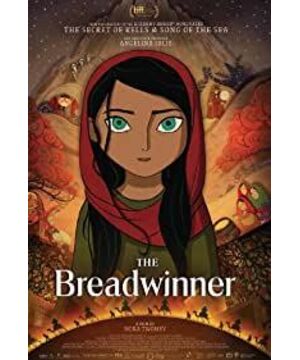Since the animated film "The Breadwinner" was a blockbuster at the Toronto Film Festival in September 2017, the animation about the tragic life of the people of Afghanistan under the Taliban has been passed down by word of mouth among film lovers. After more than a year, "The Breadwinner" is officially released in mainland China on January 11, 2019. Finally came to this moment, the wait was long but worth it. This movie, which can be called "different color" from the story to the picture, deserves more attention from people.
In the publicity of "The Breadwinner", two points are usually emphasized: the Afghan version of "Mulan", and the film's origins with "The Secret of the Book of Kells" and "Song of the Sea". These two descriptions outline some of the film's characteristics, but are not accurate.
Strictly speaking, "The Breadwinner" has no direct connection with the animated film "Song of the Sea", which was also released in China. They are both from the Irish animation studio "Cartoon Salon", whose debut feature is the famously beautifully animated "The Secret of the Book of Kells," directed by Tom Moore and Nora Tomei. Five years later, "Song of the Sea" was released, and the director was only Tom Moore.
When it came to the third animation "The Breadwinner" produced by "Cartoon Salon", the director became Nora Tomei, and Tom Moore retired as the producer. This film is also one of the few animated feature films independently completed by female directors. one. The Breadwinner is an adaptation of the novel Parvana's Waiting by Deborah Ellis, an award-winning Canadian author, feminist and anti-war who has repeatedly to Afghanistan. Such a behind-the-scenes lineup of all European and American female creators makes the film easily criticized as a sensational and peculiar story under the scrutiny of "white leftists". But putting aside those nihilistic doctrines and purely experiencing the movie with the most genuine and simple mentality, it is difficult not to be moved by it.
"The Breadwinner" is limited by the realistic theme, and there are not many dreamy and beautiful picture effects like "The Secret of the Book of Kells" and "Song of the Ocean", and the lens language appears more simple. If the audience only watches the movie for the beautiful picture, I am afraid that they have wrong expectations. The most touching thing about the film is actually the plot.
When the old-fashioned TV news "the daily life of the Afghan people is full of wars and landmines", "the Taliban atrocities have made people's lives difficult", and "women are brutally oppressed here" are separated from the rigid words, and they turn into pictures and stare right in front of your eyes, even if it is not clear. What is the Taliban, and the complex Middle East issues are unclear, and the basic empathy of being born is enough to make people worry about the fate of the protagonist.
At the beginning of the chapter, the heroine Parwana's father tells the story of the land's distant glorious past, and then the different rulers stepped on it one after another, leaving only the people who were repeatedly ravaged and the fruit of evil - the Taliban. Parvana's father was disabled, kind, a scholar, and a good father who loved his daughter. He secretly taught his daughter to read and read, and he also tried his best to support the life of the family, bringing a slightly relaxed joy to the gray reality. However, because of trumped-up charges, his father was arrested and imprisoned by the Taliban, and his mother, who was trying to rescue him, was also injured.
When there is only a mother who wipes away tears, a sister who has developed into a female figure, and a younger brother who is still in swaddling, in the absurd society of "women can't go out alone without a man" and "shops can't sell things to women", a family can even I can’t even go out to buy rice, let alone work to earn money to support my family, I can only sit at home and wait to die. Magical? This is reality.
The story "Mulan", a well-known story by the Chinese people about women disguising as men and joining the army on behalf of her father, is often interpreted as a manifestation of "filial piety". In "The Breadwinner," Parwana faces a real existential dilemma: If she doesn't cut her long hair and dress up as a boy with the body of an immature child, the family will literally be doomed. Parvana's small body shoulders the heavy responsibility of earning a family, which is also the point of "the breadwinner".
Is a little girl doing hard labor alone outside? Compared to hard work, Parwana felt more freedom. After "becoming" a boy, for the first time, she could hold her head upright and look directly at the eyes of passers-by on the street. No one scoffed at her taking to the streets, no one made a fuss about her not wearing a veil. It is ironic that a person is still the same person, but with a "gender" changed. In fact, Parwana was not alone in doing this. Outside, she met her childhood friend who was also a woman disguised as a man. When the girl proudly said to her, "Please call my male name Tlihua," her eyes were clear and firm. As an audience, I was moved but also saddened.
Little Parvana not only wants to "support her family", but also "save her father". How can a little girl with no money, no power, and no weapons save her father from the Taliban and accomplish what adults can't do? We won't do much spoilers here. However, in the second half of the film, the director's ingenious narrative technique is worth mentioning.
During Parvana's journey to rescue her father in the face of many obstacles, she constantly recalls the fairy tale of a boy named "Suleiman" who fought against the evil Elephant King to seize the seeds of hope. One side is the realistic 2D hand-painted animation in the real line, and the other side is the jumping techniques such as a lot of silhouette contrast, paper-cut collage and so on in the fairy tale line, so that the picture is significantly different from the real line.
As the real plot becomes more and more tense, the fight between the boy and the elephant god in the fairy tale is becoming more and more intense, and the two lines mirror each other, which is very exciting. When the two lines came to a close, Parwana shouted directly to Suleiman, the boundary between reality and fantasy was broken, and the two intersected here - and then a white light flashed, the elephant king fell down, and the real Parva Na also saved the day, and the audience breathed a sigh of relief. The fairy tale of the elephant king that runs through the whole film comes to an end, and the cruel truth is not revealed until this moment: it turns out that "Suleiman" is Parvana's brother who died young. When he was the age of Parwana, he picked up a toy on the street one day. In fact, it was a bomb... A white light flashed, "Suleiman" has since become the name of a brave boy in fairy tales, and the family has also Missing a brother forever.
In the fairy tale, the elephant king finally returned the seed symbolizing love and hope to the boy, and Suleiman returned to his hometown to reunite with his tribe. In reality, Parwana experienced a near-death experience, and finally pushed her bruised father tiredly and slowly home. Under the bright moonlight, my mother also brought her sister and brother to join Parvana with a limp. There was darkness all around, only the sand of the desert was blowing forever.
(This article was first published in The Beijing News, reprinting is prohibited without permission)
View more about The Breadwinner reviews











